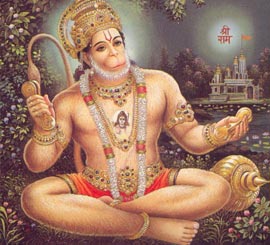There was a discussion a while back about Hanumad Ramayana and Valmikiji being reborn as Tulsidasji. I am posting the story here which I read about. Please correct me if anything in it is untrue.
After the victory of Rama over Ravana, Hanuman went to the Himalayas to continue his worship of the Lord. There he scripted a version of the Ramayana on the Himalayan mountains using his nails, recording every detail of Rama's deeds. When Maharishi
Valmiki visited him to show him his own version of the Ramayana, he also saw Lord Hanuman's version and became very disappointed. When Hanuman asked him the cause of his sorrow, he said that his version, which he had created very laboriously was no match for the splendour of Hanuman's, and would therefore, go ignored. At this, Hanuman took those rocks on one shoulder and Valmiki on the other, and went to the sea. There he threw his own version into the sea, as an offering to Rama. This version, called the 'Hanumad Ramayana', has been unavailable since then.
Maharishi Valmiki was so taken aback that he said he would take another birth to sing the glory of Hanuman which he had understated in his version. (It is said that Saint
Tulsidas who composed the
Ramcharitmanas was none other than the Maharishi Valmiki reborn to fulfill his desire).
Later, one tablet is said to have floated ashore during the period of Mahakavi
Kalidasa, and hung at a public place to be deciphered by scholars. Kalidasa is said to have deciphered it and recognised that it was from the Hanumad Ramayana recorded by Hanuman in an extinct script, and considered himself very fortunate to see at least one
pada of the stanza.
http://tripatlas.com/Hanuman#Hanumad%20Ramayana
Another version of Hanumad Ramayana:
It is considered that Hanuman originally scripted a version of the Ramayana on clay tablets, recording every detail of Rama's deeds, and brought them to Rama for his blessings of that narrative. Rama out of modesty is said to have declined the recording, considering instead his own deeds, simply his righteous duties. Dejected by this, Hanuman is said to have brought these clay tablets to seashore, recited each verse, broken each tablet on his knee and thrown it into the sea. This version is called the Hanumad Ramayana and is unavailable since then.
But one tablet is said to have floated ashorecame ashore, during the period of Mahakavi Kalidasa, and hung at a public place to be deciphered by scholars. Kalidasa is said to have deciphered it and recognized that it was from the Hanumad Ramayana recorded by Hanuman in an extinct script, and considered himself fortunate enough to see at least one foot of the stanza. http://www.spiritus-temporis.com/hanuman/hanumad-ramayana.html
Another similar version:
A parable is told that Hanuman originally scripted the entire Ramayana on claytablets, recording each and every detail of what Rama did, and brought them to Rama, to bless that narrative. Rama humbly said to Hanuman, "I have not done anything that great, to be recorded and narrated to people…I have done my righteous duty…that's all" Then Hanuman was upset. Dejected by the slighting away of his great deeds as simple acts of duty by Rama, Hanuman brought those clay tablets to seashore, recited each verse, broke each tablet on his knee and threw into the sea. This is called hanumad ramayana. This is unavailable from then on. But one tablet came ashore floating on the sea, which is retrieved during the period of Mahakavi Kalidasa, and hung at a public place to be deciphered by scholars. There on that tablet only one foot of a stanza is available. That foot says "Oh! Ravana, those your ten heads, on which you lifted of Mt. Kailsha, the abode of God Shiva, are now bumped by the feet of crows and eagles, know what has happened to your high-headed pride, at the hands of virtue…" Kalidasa deciphers it and informs that is from hanumad ramayana recorded by Hanuman, but an extinct script, and salutes that clay plate for he is fortunate enough to see at least one foot of the stanza.
It is said that none can conclusively narrate about Hanuman, for he is many faceted. He is symbolic for his unwavering dedication to righteousness, unstinting performance of entrusted duties, unfailing talents in serving his master, namely Rama.
http://www.websters-online-dictionary.org/Ha/Hanuman.html


















comment:
p_commentcount